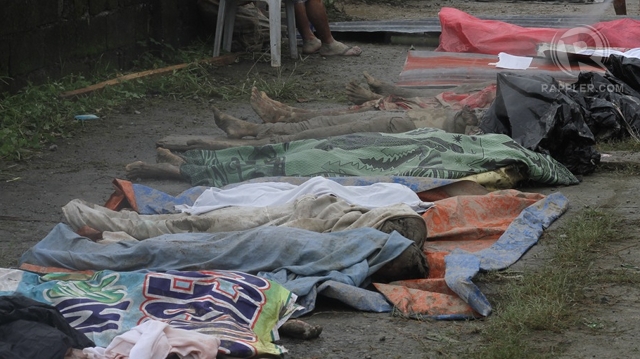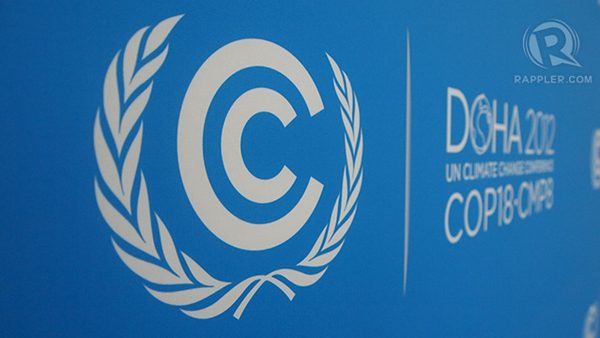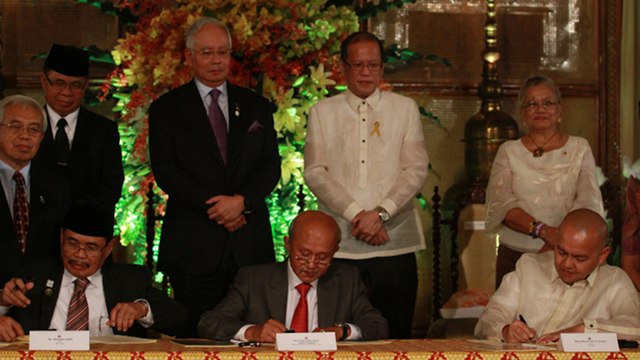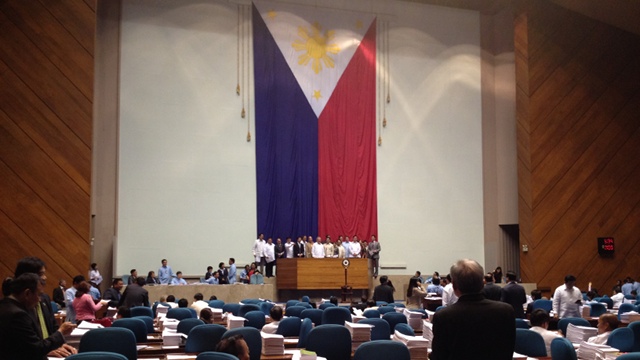SUMMARY
This is AI generated summarization, which may have errors. For context, always refer to the full article.
- Typhoon death toll still rising with hundreds missing

Typhoon Pablo (international name Bopha), the strongest of 2012, has weakened and is on its way out of the Philippines, but it leaves behind a trail of devastation and destruction. At least 325 people are dead with hundreds missing. The National Disaster Risk Reduction Management Council says it expects that number to rise. More than 177,000 are still in evacuation centers. The UN says the casualties are significantly lower than in the past because of an effective early warning system, but Philippine President Benigno Aquino said, “Any casualty is a cause for distress.”
Read more about Pablo’s impact, the photos and the early warning system which saved lives—all on Rappler. - What can the world do about climate change?

The Philippines is a battleground—the frontlines in the fight against climate change. A UN report says its 7,100 islands rank third in the world in terms of vulnerability and climate risk. After destructive typhoons and unexpected weather disturbances, Filipinos are coming together with systems to cope. Still, it’s not enough. Senior negotiator Bernarditas Mueller tells the United Nations Framework Convention on Climate Change (UNFCC) ongoing in Doha that she “cannot sit here and allow only those interests of developed countries to prevail, demanding more mitigation from developing countries in the face of very low ambitions of developed countries.” The UNFCCC enters its second day.
Read more on Rappler. - ‘Why Nations Fail’ author says vested interests keep nations poor

Politics matter. For a nation to grow and provide for its people, institutions are key, says co-author and Harvard professor James Robinson in a conversation with Rappler’s Maria Ressa. Politics needs to create political and economic institutions which go from being ‘extractive’ or fulfilling the needs of only those in power to ‘inclusive’- sharing the benefits of power with a wider majority. We compare the Philippines to a stage of development similar to the United States at the age of Industrialization – when it dealt with Tammany Hall, massive corruption in government, the robber barons, the Mafia, sweatshops – and slowly evolved to devolve power to the people. Robinson tells Filipinos, “the job was just half-done in 1986. Now you have to go the whole way.”
Read and watch on Rappler. - US: Syria preparing to use chemical weapons against its people
US officials told NBC News the Syrian military is ready to use chemical weapons against its own citizens. Precursor chemicals for sarin, a deadly nerve gas, have allegedly been loaded into aerial bombs ready to be dropped on rebel strongholds. Last Tuesday, officials said there was no proof mixing of the “precursor” chemicals had begun. By Wednesday, confirmation came that the nerve agents were loaded inside the bombs. Secretary of State Hillary Clinton issues a statement warning Syrian President Bashar Assad not to use chemical weapons, adding he would be crossing “a red line” if he did so. NBC News sources say Clinton is expected to officially recognize the main opposition movement, the National Coalition of Syrian Revolutionary and Opposition Forces next week.
- Bloodshed as Islamists and secular protestors in Egypt clash over controversial constitution

It’s Islamists versus secular protesters in Cairo as violence breaks out around the presidential palace Wednesday night. Three senior advisers to Mohamed Morsi, Egypt’s first freely elected president, resigned during the clashes, blaming the president for the bloodshed. Morsi’s prime minister appealed to both sides to halt the clashes and make room for “dialogue.” Periodic gunshots could be heard, while both camps brandished makeshift clubs and some knives. Riot police retreated, useless against the warring masses. Both sides claimed one of its members had been killed in the melee. The breakout of violence casts doubts on the ability of Mr. Morsi’s referendum on December 15 to calm down the factions. A draft constitution approved by his Islamist allies over the objections of the secular opposition and the Coptic Christian Church is up for approval. Morsi’s secular critics accuse him of seeking to establish a new dictatorship.
Read more on the New York Times. - Landmark agreement face huge obstacles

It’s a breakthrough in Mindanao, says the International Crisis Group in its new report released Wednesday. The framework agreement setting up a new region called the Bangsamoro is an example of creative thinking and flexibility on both sides. It acknowledges the failure of the 1996 MNLF agreement and the Autonomous Region in Muslim Mindanao. Still, the devil’s in the details and there are huge obstacles ahead.
Read more on Rappler. - Fighting corruption, Philippine style
 Much has been said about the Aquino administration’s campaign against corruption. Analysts say it underpins the confidence which has buoyed the Philippines’ Q3 growth to 7.1%, second only to China in Asia. Still, an annual Transparency International report places the Philippines at the bottom half – 105 out of 176 in this year’s Corruption Perceptions Index (CPI). Officials are being held accountable – from former Chief Justice Renato Corona to 13 DBP officials sacked over P660 million loans to the Ongpin group.
Much has been said about the Aquino administration’s campaign against corruption. Analysts say it underpins the confidence which has buoyed the Philippines’ Q3 growth to 7.1%, second only to China in Asia. Still, an annual Transparency International report places the Philippines at the bottom half – 105 out of 176 in this year’s Corruption Perceptions Index (CPI). Officials are being held accountable – from former Chief Justice Renato Corona to 13 DBP officials sacked over P660 million loans to the Ongpin group.
Read more about Transparency International’s report on BusinessWorld and the sacked DBP officials on Rappler. Watch the talk with Grace Pulido-Tan, Chairperson of the Commission on Audit (COA), here. - HIV increases in PH driven by men having sex with men
 Social media is helping fuel the increase of HIV cases in the Philippines, bucking the global trend. A survey shows that the number of men having unprotected sex with men has increased because social media has made it easier to hook up. According to some respondents, they had as many as 500 sex partners a year. The average number of sexual partners from online social networking sites was pegged at 82.
Social media is helping fuel the increase of HIV cases in the Philippines, bucking the global trend. A survey shows that the number of men having unprotected sex with men has increased because social media has made it easier to hook up. According to some respondents, they had as many as 500 sex partners a year. The average number of sexual partners from online social networking sites was pegged at 82.
Read more on Rappler. - Instagram vs Twitter

The battle for your photos kicks into high gear. Shortly after Facebook acquired Instagram, relations with Twitter began to sour. On Wednesday, Instagram disabled part of its users’ ability to display their photos on Twitter. Instead, if you want to see the picture, you’ll have to be redirected to Instagram’s site. Instagram’s CEO said, “We’ve decided that right now, what makes sense is to direct our users to the Instagram website.”
Read more on the New York Times and on Rappler. - Will the RH bill pass? House fails to vote this week

Is there trouble in the ruling party’s camp? Will President Aquino certify the RH bill urgent? Is that necessary? It’s coming down to the wire. Palace sources told RH bill supporters to expect results this week, but long, excruciating sessions end with no vote. Anti-RH bill supporters say they see victory ahead – as do pro-RH advocates. Who will win?
Read more on Rappler.
Add a comment
How does this make you feel?

There are no comments yet. Add your comment to start the conversation.